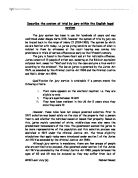There are also people who are ineligible for jury service, ineligible is where people cannot do jury service for certain reasons for example; people who suffer from mental illnesses, priests, monks and nuns and people on bail.
M.P.S, people in the armed forces, doctors and nurses, and people over the age of 65 may be excused as a right. This may be because they have duties, which are considered to be more important to the public i.e., rather than being at jury service a doctor could be saving somebody ‘s life.
Discretionary excusal is a process where the judge will excuse people for certain reasons these may be that the juror will be away at the time of the trial, the juror may have childcare problems and the juror may have problems with the accused. The judge would usually defer the juror rather than totally excuse the juror until the juror can continue with jury service.
There is also a term called discharge, this is where there is doubt about a juror’s ability to serve on the trial for example the juror may have language problems or deafness. The judge will decide whether to discharge the juror.
In section 41 of the Criminal Justice and the public order act 1994 it states that the judge can discharge the juror, if the person in the judges eyes is not capable of acting effectively as a juror because of a physical disability.
Computers randomly produce a list of potential jurors; this is done from the electoral register. Summonses are sent out to the potential juror with a form to return stating that the person can or cannot attend jury service stating approximate reasons. When they are returned a jury panel is formed. Jury service is compulsory for those not disqualified, ineligible or excused, those failing to attend on the day of court or under the influence of drink or drugs, can lead to contempt of court, resulting in a fine or a prison sentence.
There are twelve jury members in the English court, there must never be less than nine, but in the country courts there are eight jurors.
Of course all jurors must be vetted (checked out) this is done using police records, and the security service records. In one case;
R v SHEFFIELD CROWN COURT, EX PARTE BROWNLOW,
The defendants were police officers; the defence wanted the jury vetted in case of previous offences/convictions. The prosecution did oppose it, but the Crown Court judge ordered that vetting should take place; the court of Appeal upheld the decision. Lords Deming and Shaw, condemned vetting in security and terriost cases because it was not stated in the Juries Act 1974 and they said that it was an invasion of privacy.
The role of the jury is to decide whether or not the accused is guilty or not guilty. The jury may take notes while in court, and are also given documentary evidence or photographs. When it is time for the jury to make a verdict, they are taken off to another room to discuss the case and all of the evidence; the jury are not allowed to discuss the case to anyone at all apart from the judge and other jurors. If a juror does discuss the case with anyone else he will be held in contempt of court and will face a fine or sentence.
For example; if the juror was talking to the defendant or giving him lifts to the court, he would automatically be dismissed from jury service.







